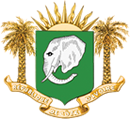1st INTERNATIONAL SEMINAR ON TEACHING THE ETHICS OF ARTIFICIAL INTELLIGENCE IN AFRICAN UNIVERSITIES UNIVERSITE ALASSANE OUATTARA
query_builder 01-12-2023
- Senator DJIBO Youssouf Nicolas, representing Madam
President of the Senate,
- Mr. Chef de Cabinet of the President of the Haute Autorité pour la Bonne
Gouvernance representing the President,
-Mr Secretary General of the Ivorian National Commission for UNESCO, representing
Commission Nationale Ivoirienne pour l'UNESCO, representing the Minister of Education and
Literacy,
- Mr. Representative of the Minister of Higher Education and Scientific Research
Recherche Scientifique,
- the Representative of the Minister of Foreign Affairs, African Integration and
Intégration Africaine et des Ivoiriens de l'Extérieurs,
-Monsieur le Représentant du Ministre des Transports, Maire de la Commune de Bouaké
Bouaké,
-Representative of the Minister of Equipment and Road Maintenance
Maintenance,
- Representative of the Minister of Communication, Government Spokesman,
- Monsieur le Représentant du Ministre de l'Environnement, du
Développement Durable et de la Transition Ecologique,
- Monsieur le Représentant du Ministre de l'Enseignement Technique, de la
Formation Professionnelle et de l'Apprentissage,
- Mr. UNESCO Resident Representative in Côte d'Ivoire,
-The Prefect of the Gbêkê Region, Prefect of Bouaké,
- Mr. Representative of the President of Alassane Ouattara University,
- Madam Honorary President of Lorougnon Guédé University,
- Ladies and Gentlemen, University Presidents and Vice-Presidents,
- Mr General Secretary,
-Mr. Holder of the UNESCO Chair in Bioethics,
- Holder of the UNESCO Chair in Toulouse,
- Deans, Directors of Institutes and Research Centres, Heads of Departments
Heads of Departments,
- Trade union leaders,
-Ladies and Gentlemen, Seminar experts,
- Fellow lecturers and researchers,
- Dear members of the administrative staff,
- Ladies and Gentlemen of the press,
- Dear students,
- Ladies and Gentlemen,
- Distinguished participants,
It gives me great pleasure to take the floor at the 1st International Seminar on "Teaching the Ethics of Artificial Intelligence in African Universities", organized by the UNESCO Chair in Bioethics at Alassane OUATTARA University.
I would like to begin by expressing my sincere thanks to the Minister of Education and Literacy, Professor KONE Mariatou, President of the Ivorian National Commission for UNESCO, and to the Minister of Higher Education and Scientific Research, Professor Adama DIAWARA, for agreeing to co-chair this important seminar, and for their invaluable support for the UNESCO Chairs at Côte d'Ivoire universities.
I would also like to express my gratitude to the Director-General of UNESCO, Ms Audrey AZOULEY, for UNESCO's constant support to Côte d'Ivoire and for regularly placing the African continent at the heart of UNESCO's priority programs and actions.
I would also like to thank the heads of the UNITWIN/UNESCO Chairs programme, the UNESCO Resident Representative in Côte d'Ivoire, Mr Omar DIOP, and the Secretary General of the Côte d'Ivoire National Commission for UNESCO, Mr SORO N'Golo, for their support in implementing UNESCO programmes in Côte d'Ivoire.
I would also like to express my satisfaction at the effective holding of this Seminar on Teaching the Ethics of Artificial Intelligence in African Universities, with which the Permanent Delegation of Côte d'Ivoire to UNESCO has been closely associated. Referring to the twelve (12) partner universities of this Seminar, I can affirm that the UNESCO Chair in Bioethics at Alassane OUATTARA University, which welcomes us this morning, has taken the full measure of the idea contained in this African proverb: "If you want to go fast, walk alone, but if you want to go far, walk together".
The holding of this Seminar, the first of its kind in Africa on the theme of teaching the ethics of Artificial Intelligence, honors Côte d'Ivoire and the whole of Africa, thanks to the initiative of the UNESCO Chair in Bioethics.
As one piece of good news leads to another, I am pleased to announce that Côte d'Ivoire has just been elected to UNESCO's Intergovernmental Bioethics Committee, thanks once again to the expertise of the UNESCO Chair in Bioethics, whose holder, Professor Lazare POAME, Philosopher and Bioethicist, and Honorary President of Alassane OUATTARA University, is constantly stepping up his efforts to promote bioethics in Africa.
That's why I'd like to take this opportunity to congratulate the entire team behind the UNESCO Chair in Bioethics at Alassane OUATTARA University. Need I remind you that, in the field of bioethics, Côte d'Ivoire was the first country on the African continent to set up a National Bioethics Committee, initiated by Professor Lazare POAME, with UNESCO's support?
Ladies and Gentlemen
Artificial Intelligence, with its great capacity to imitate human reasoning through calculation algorithms inspired by the behavior of the human brain, has brought about a profound transformation of our societies.
It is revolutionizing the way we live, work and think.
For the famous mathematician Alain TURING, Artificial Intelligence is the ability to "make machines think".
Indeed, Artificial Intelligence has the extraordinary potential to positively influence decision-making in all areas of life. These include machine translation, improved defense and security capabilities, quality of education, agricultural techniques, business productivity, medical diagnosis, prevention and early detection of numerous ailments.
Despite its many advantages, Artificial Intelligence can pose a threat to humanity. It is therefore incumbent on humanity to invent a normative framework underpinned by an ethic of responsibility, in order to prevent the risks associated with this technology, such as the development of biological products, cyber-attacks, disinformation and so on.
Hence the UNESCO Recommendation on the Ethics of Artificial Intelligence, which was adopted in November 2021 by 193 countries to address the uncontrolled and malicious uses of Artificial Intelligence.
By incorporating this digital technology into their public policies, African countries can turn it into a major growth lever for their economies, and a real opportunity in terms of education, health, the environment and food security.
In this respect, it is pleasing to note that some African countries have already drawn up a national Artificial Intelligence strategy.
However, the challenge is to implement these strategies effectively and efficiently.
It is therefore important for the African continent to appropriate this revolutionary technology by developing its own Artificial Intelligence models adapted to its specificities and socio-cultural context.
Hence the interest of this 1st International Seminar on Teaching the Ethics of Artificial Intelligence in African Universities. It takes place in a global context dominated by the multiple and diverse uses of artificial intelligence, which call for scientific ethics.
What's more, it fits in perfectly with UNESCO's Operational Strategy for Priority Africa 2022-2029, particularly in terms of Flagship Programme 4 on Artificial Intelligence. Its overall objective is as follows: "Putting new and emerging technologies at the service of sustainable development in Africa, particularly in the context of implementing the Recommendation on the Ethics of Artificial Intelligence".
The main objectives include
- improve the capabilities of African countries in the adoption and implementation of artificial intelligence,
- improve the capacity of all Artificial Intelligence players in Africa,
- and to propose Artificial Intelligence solutions that are ethical.
The themes chosen for this Seminar are therefore highly relevant to UNESCO. I would like to highlight two of them:
1. Applications of Artificial Intelligence in sectors such as education, communication, health, agriculture and, of course, teaching and research, the focal point of the Seminar;
2. Values and ethical principles of Artificial Intelligence.
These two points enable me to outline the expectations of the African continent with regard to this seminar. These expectations are as follows:
- To help African states appropriate the UNESCO Recommendation on the Ethics of Artificial Intelligence,
- Successfully implement AI in the above-mentioned sectors (communication, health, agriculture, education and research);
- Develop training modules for African universities on the ethics of Artificial Intelligence.
- Train highly qualified African researchers in the field of Artificial Intelligence Ethics.
All in all, it's a question of consensually designing Artificial Intelligence for Africans and by African researchers.
That's why I'm suggesting that the modules that will be developed by consensus be taught in all African universities, notably through the African virtual university platforms.
I propose that, in addition to the partnership with CAMES, the Université Libre de Bruxelles and the Académie Royale Belge, the UNESCO Chair in Bioethics strengthen regional and international cooperation by establishing partnerships with :
- the Centre Africain de Recherche sur l'Intelligence Artificielle in Brazzaville
- the Artificial Intelligence Research Center in Ghana,
- UNESCO category 2 centers dedicated to Artificial Intelligence, such as:
+the International Center for Artificial Intelligence in Morocco,
+the International Center for Artificial Intelligence Research and Ethics in Saudi Arabia,
+Slovenia's International Center for Artificial Intelligence,
+the Artificial Intelligence Technology Center in Singapore.
In view of the relevance of the themes chosen by the scientific committee, I remain convinced that the implementation of the recommendations resulting from this seminar will have a significant impact in promoting the Ethics of Artificial Intelligence in Africa.
In closing, I would like to reiterate my congratulations to the organizers of this seminar, which will undoubtedly enable the implementation of a genuine continental strategy for the Teaching of the Ethics of Artificial Intelligence, and place Africa at the heart of global reflection on the stakes, challenges and opportunities of this technology, which UNESCO has so brilliantly included in its programs.
Thank you very much.





